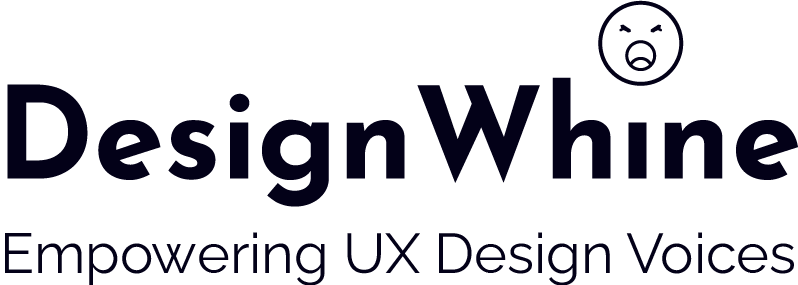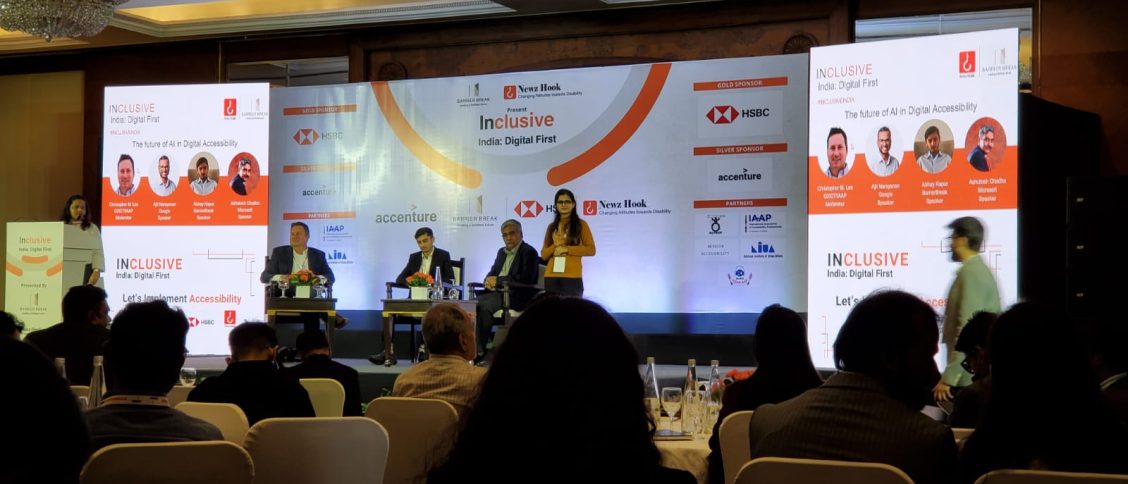The Inclusive India Digital First 2023 event, organized by Newz Hook and powered by BarrierBreak, recently gathered thought leaders, experts, and advocates to explore ways of making the digital world more inclusive. Held on December 14, 2023, at Hotel Eros in New Delhi, from 9:30 am to 5:30 pm, this one-day conference provided an excellent opportunity for learning, sharing, and networking within the Digital First ecosystem.
I particularly looked forward to the Digital Accessibility Track, believing it would illuminate innovative strategies, challenges, and the ever-evolving landscape of accessibility.
Government Perspective on Accessibility in India
Commencing the conference was a keynote delivered by Shri Rajesh Aggarwal, Secretary of the Department of Empowerment of Persons with Disabilities (DEPwD) at the Ministry of Social Justice and Empowerment (MSJE), Government of India. Shri Aggarwal, in shedding light on the government’s perspective on accessibility in India, established an optimistic tone. He emphasized that designs for accessibility should exude positivity, avoiding a somber appearance. This approach not only mirrored the government’s dedication to functional accessibility initiatives but also highlighted a commitment to fostering a positive and inclusive experience. It was heartening and inspiring to learn that, through various schemes, the government is actively contributing to a bright and hopeful future for accessibility.
Building Inclusive Bridges: Lainey Feingold’s Keynote on Accessibility
In a captivating keynote address, Lainey Feingold, a distinguished lawyer and public speaker from the Law Office of Lainey Feingold, delivered a compelling message emphasizing the inherent right of all individuals to belong. Backed by staggering statistics, she reminded the audience that 20 million people in India alone have some form of disability. Using a powerful analogy, Feingold portrayed accessibility as a bridge connecting both the abled and differently-abled communities, stressing that this bridge could be constructed with compassion and empathy. As accessibility designers, she asserted, we are the builders of these bridges.
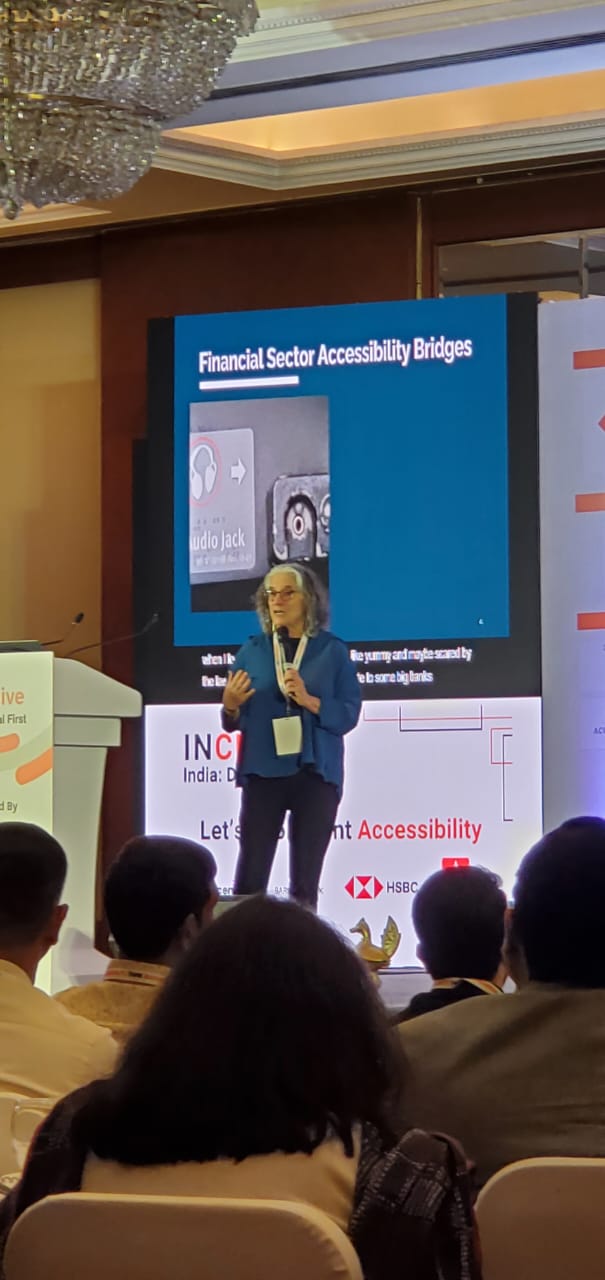
Feingold provided insightful examples, such as the existence of a talking ATM in India designed for individuals with disabilities. She delved into various sectors, including finance, health, grocery, e-commerce, restaurant payments, voting websites, employment technology, sports, and more, underscoring the need for bridges in these domains. Beyond the moral imperative, Feingold emphasized that accessibility is not only ethically essential but also a good for business. She shared profound insights into the power of structured negotiation as a catalyst for advancing accessibility. Encouraging the audience to celebrate incremental achievements, Lainey advocated for a collaborative approach, encouraging everyone to embody the spirit of a “dolphin” rather than a “shark” in the pursuit of accessibility to remove the underlying fear.
HSBC’s Commitment to Digital Accessibility
HSBC took on the role of the gold sponsor for the conference. During a virtual keynote, Robert Hsu, Senior Manager in Digital Experience & Accessibility at HSBC, offered insights into the bank’s unwavering commitment to digital accessibility. As a testament to its dedication, HSBC, as a leading financial institution, exemplified the transformative impact of prioritizing accessibility within the sector. Hsu’s presentation served as an inspiring illustration of how organizations can set a positive example, cultivating an inclusive digital environment.
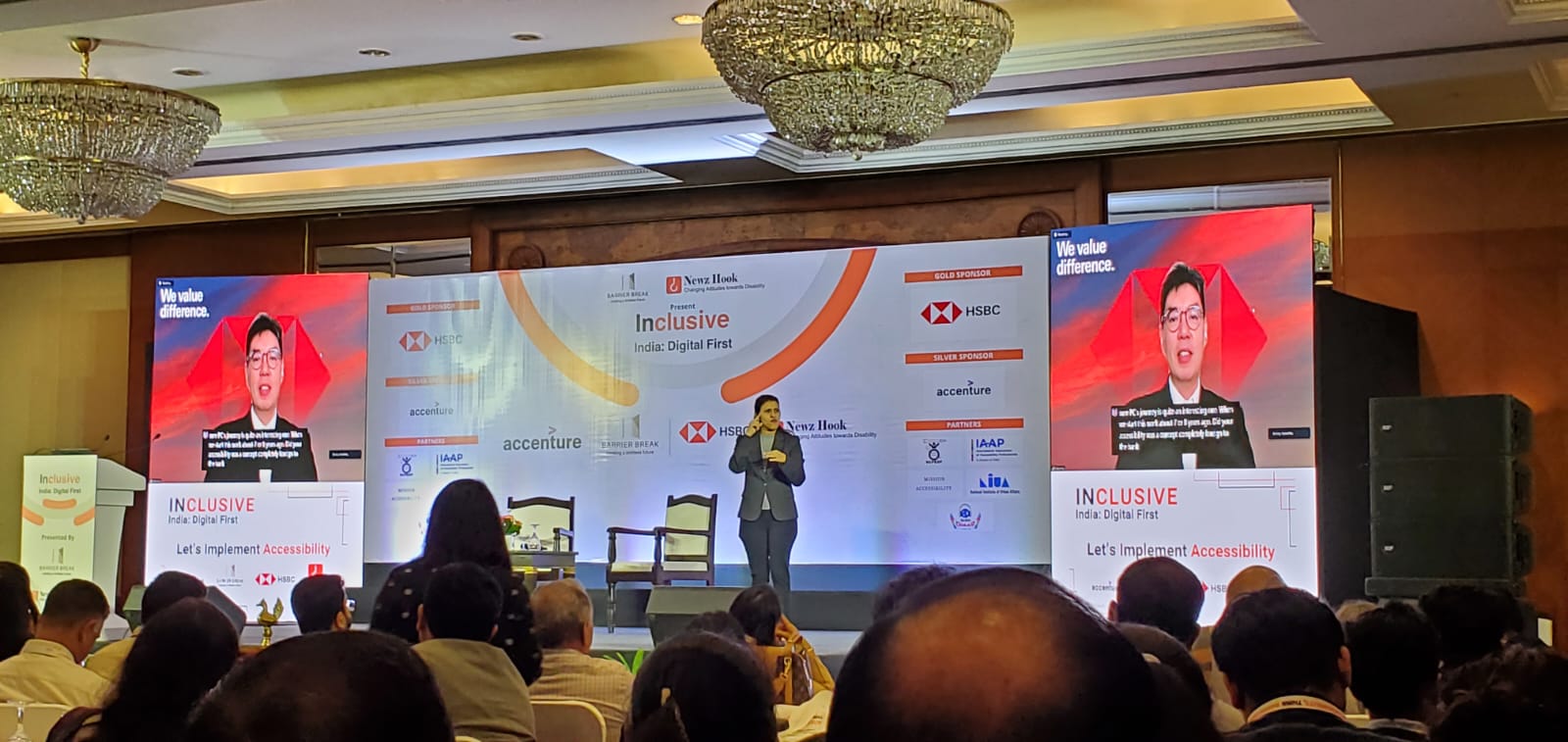
Noteworthy is HSBC’s status as one of the pioneers in digital accessibility globally, standing out as the most accessible bank in Hong Kong. The bank’s commitment extends to serving individuals with epilepsy, numbering 65 million globally, showcasing HSBC’s dedication to inclusivity in its digital offerings.
Insights from the WCAG 2.2 Panel Discussion
The subsequent segment unfolded as a thought-provoking panel discussion focused on WCAG 2.2, skillfully moderated by Srinivasu Chakravarthula. The panel featured esteemed speakers including Priti Rohra from BarrierBreak, Avneesh Singh from DAISY Consortium, and Aparna Singhal from Pitney Bowes.
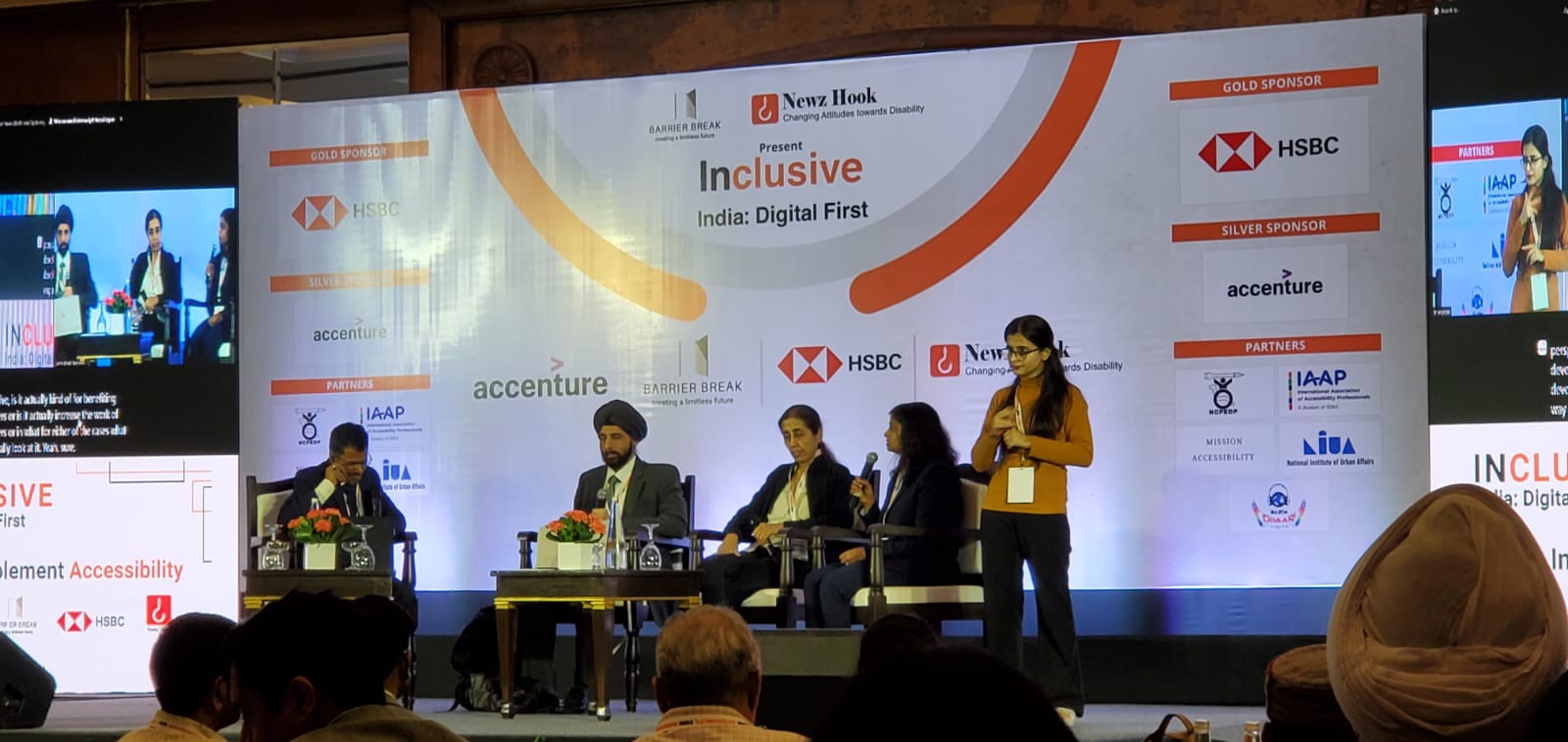
Among the various engaging topics explored during the panel, a particularly noteworthy discussion revolved around the 1:10:100 concept, underscoring the costs associated with incorporating accessibility. The concept emphasized that including accessibility at the beginning of digital product development costs $1, but this cost amplifies to $10 during development and exponentially rises to $100 if addressed as an afterthought due to penalties, lawsuits, and litigations.
The conversation also delved into the significance of alt text, emphasizing that even small icons should have descriptive alt text. Additionally, the panel urged designers to be mindful of color choices and consider the size of components in the user interface being designed.
The session expanded its focus to explore Epub accessibility and its associated benefits. Furthermore, the importance of Content Management Systems (CMSs) like WordPress and Drupal incorporating support for WCAG 2.2 was underlined.
The panelists also underscored the critical role of user testing conducted by individuals with disabilities. Simultaneously, there was a call to simplify existing standards, recognizing the current complexity and difficulty in understanding them. The discussion echoed a collective commitment to creating a more inclusive and comprehensible digital environment.
Building Accessible SAAS Products
The subsequent panel discussion, skillfully moderated by Shilpi Kapoor, the founder, and CEO of BarrierBreak, featured an esteemed lineup of speakers, including Srinivasu Chakravarthula from Freshworks, Sushmita Ranjan from Salesforce, and Nirat Bhatnagar from Belongg. This insightful session delved into the intricacies of overcoming accessibility challenges specifically in the realm of building Software as a Service (SAAS) products.
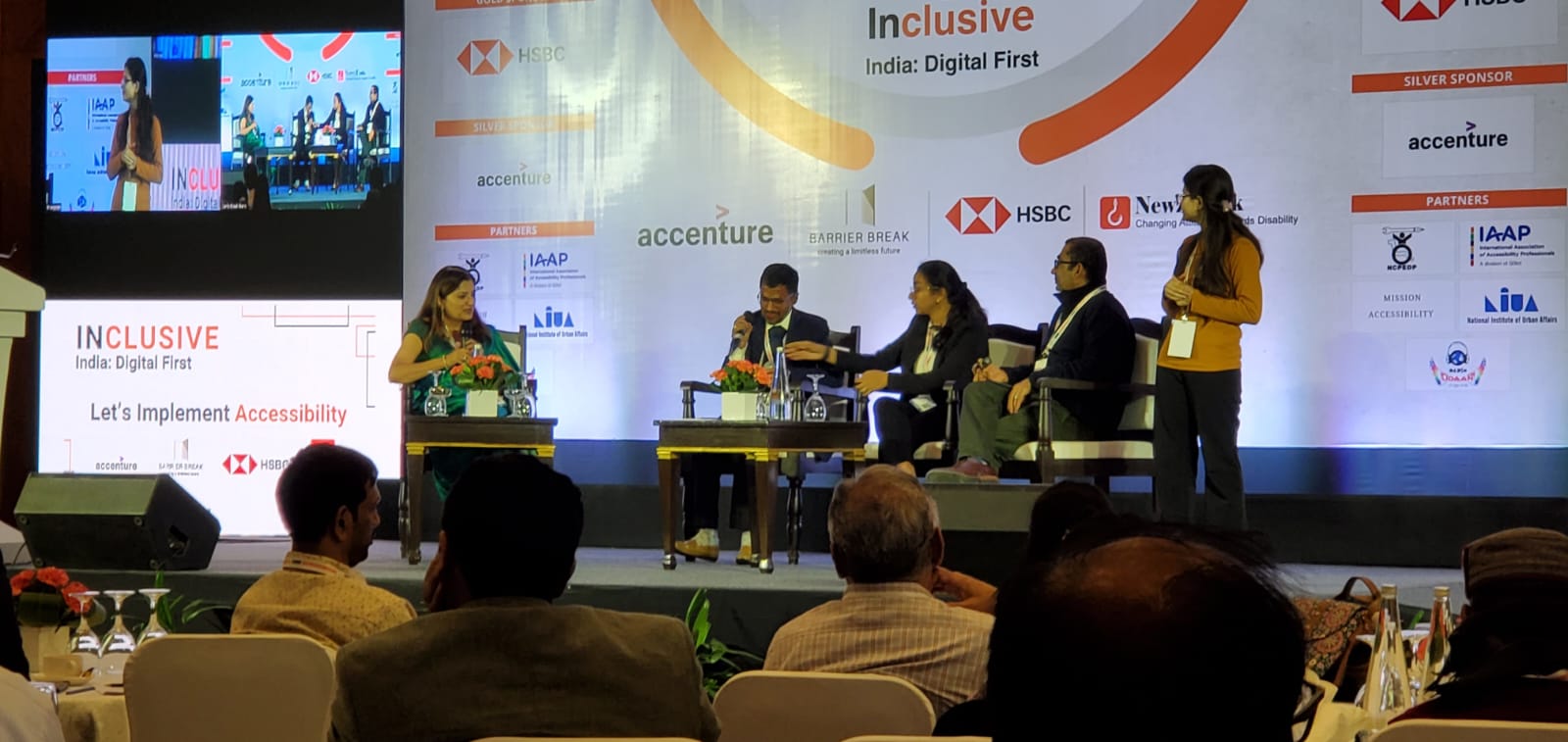
Srinivasu Chakravarthula, the Director of Product Accessibility at Freshworks, took center stage, advocating for internal policies and introducing the innovative “Accessibility Champion” model. The session placed a strong emphasis on the pivotal role of proactive measures in seamlessly integrating accessibility standards into the fabric of product development. Furthermore, it encouraged the formulation of internal policies, urging stakeholders to recognize the benefits of accessible SAAS products for both the company and its business prospects.
The discussion also highlighted the importance of not only drafting internal policies but also engaging stakeholders in understanding the tangible advantages of incorporating accessibility from the outset. Convincing stakeholders of the business benefits of accessible SAAS products was deemed essential for creating a conducive environment for accessibility integration. The session concluded with a powerful call to empower and motivate designers and developers, recognizing their instrumental role in driving accessibility initiatives forward within the SAAS product development landscape.
Digital Accessibility Testing: A Holistic Approach
The ensuing panel discussion, expertly moderated by Prashant Ranjan from NAB Delhi, brought together voices of expertise including Fahad Lambate from BarrierBreak, Monika Singhal from Wipro Technologies, and Sumeet Agrawal from TCS. This dynamic session placed the spotlight on the paramount importance of digital accessibility testing, emphasizing the nuanced interplay between manual and automation testing techniques.
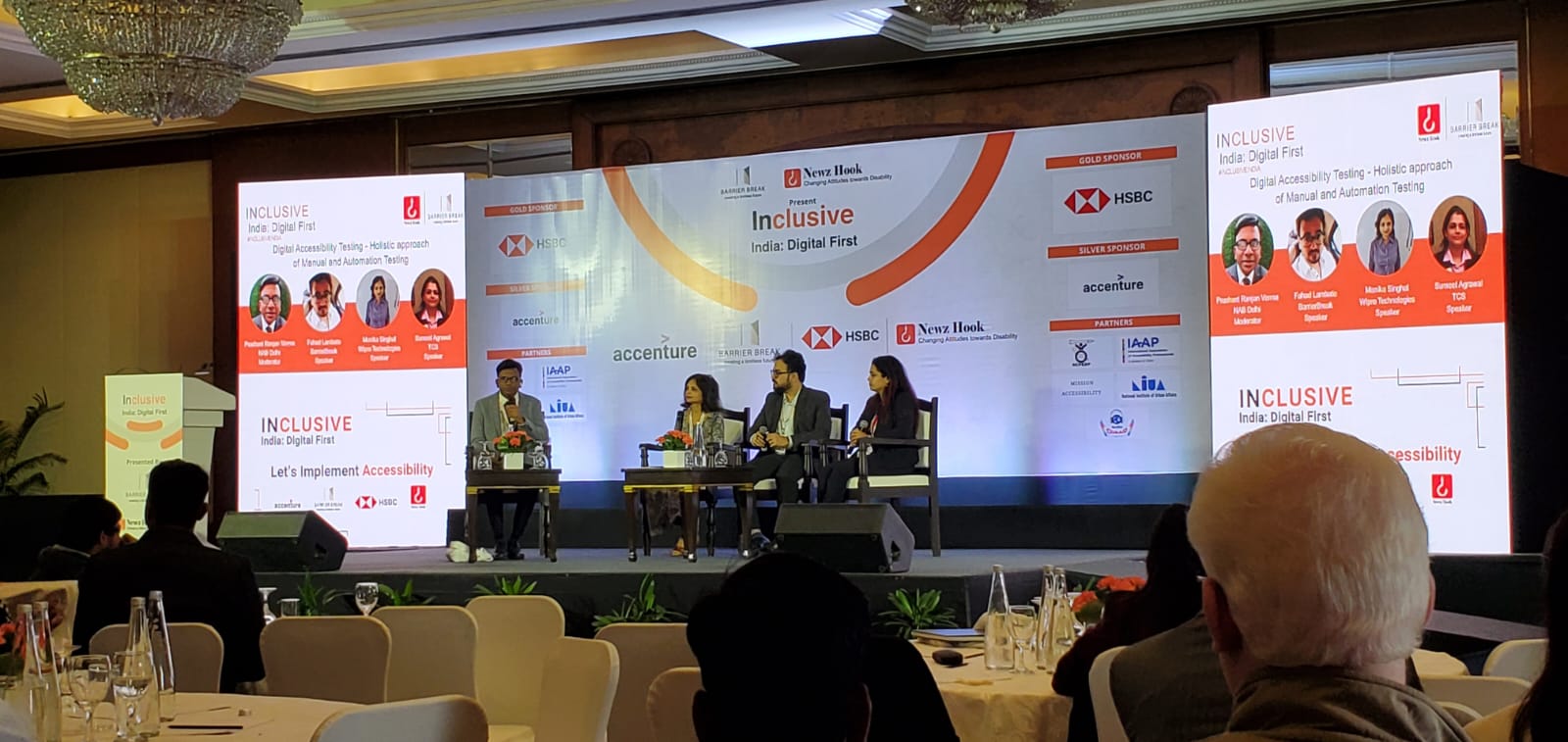
A central theme that emerged during the discussion was the pivotal role of inclusivity, particularly emphasizing the need to include individuals with disabilities in the testing process. This critical inclusion ensures not only comprehensive evaluations but also fosters a user-centric approach to product development. The session provided a deep dive into the holistic approach indispensable for robust digital accessibility testing, shedding light on the multifaceted strategies required to ensure inclusivity at every stage of the testing process.
One of the key takeaways from the session was the recognition of the indispensable role played by individuals with disabilities in the testing process. The discussion underscored that their involvement is not just a checkbox requirement but a strategic necessity for ensuring digital products are truly accessible. The emphasis on inclusive testing was seen as a foundational pillar for creating digital solutions that cater to diverse user needs.
The future of AI in Digital Accessibility
Christopher M. Lee of G3ict/IAAP skillfully moderated the subsequent panel discussion, bringing together distinguished experts: Ajit Narayanan from Google, Abhay Kapur from BarrierBreak, and Ashutosh Chadha from Microsoft.
During this insightful session, the experts delved into the transformative possibilities of Artificial Intelligence (AI) for developers in implementing robust accessibility features. The conversation highlighted AI’s remarkable empowerment, particularly in enhancing digital experiences for individuals with disabilities.
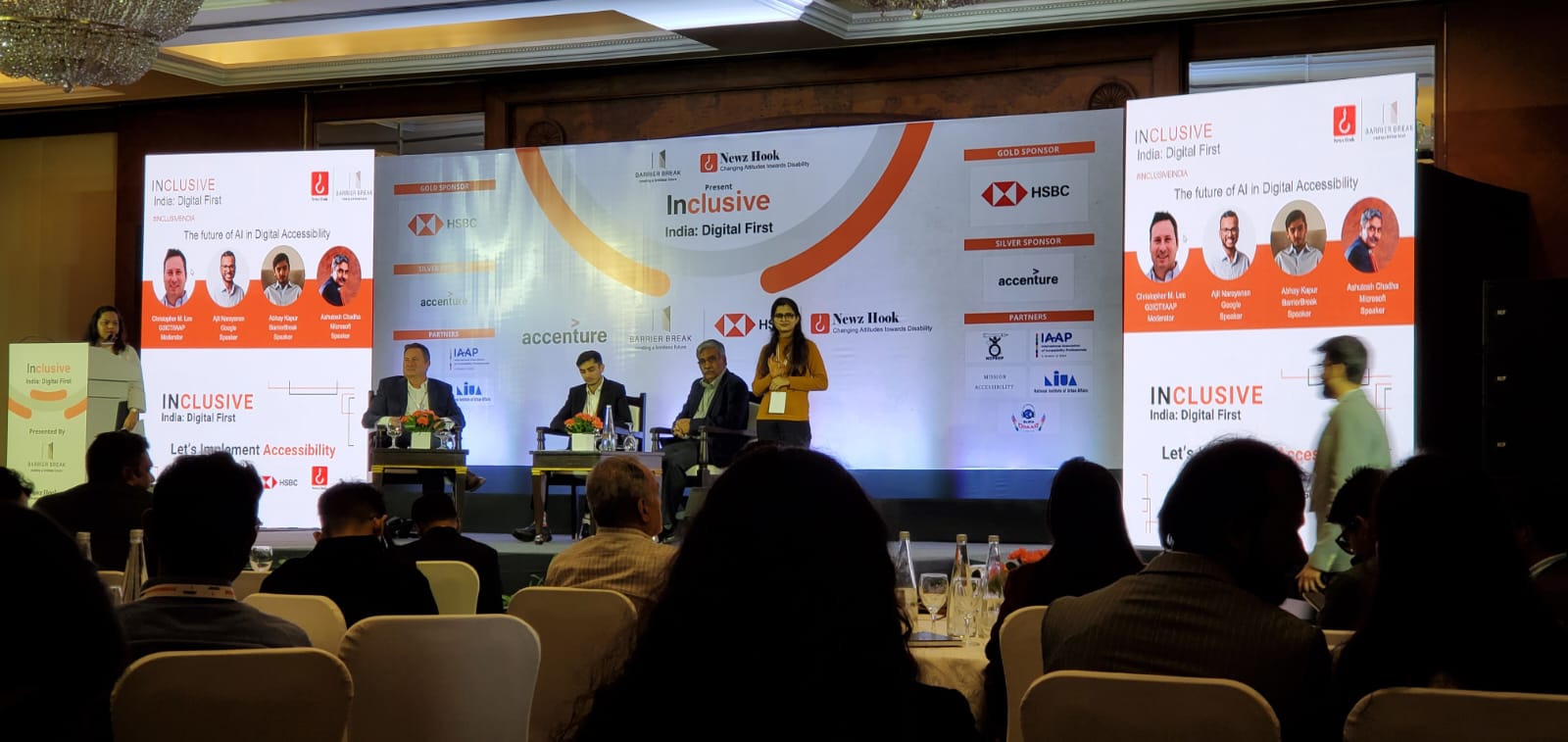
The discussion also addressed existing biases and challenges within AI systems, emphasizing the need to understand and address accessibility requirements. This examination shed light on the intricate intersection between AI and digital accessibility.
A crucial aspect of the conversation focused on harnessing AI to assist developers in implementing accessibility measures, aiming to make code inherently more accessible. The experts stressed the importance of integrating AI into the coding process, presenting a forward-thinking approach to inclusivity in digital experiences.
The forward-looking dialogue facilitated a nuanced understanding of the complex relationship between AI and digital accessibility. By acknowledging both the potential benefits and challenges, the session offered a comprehensive perspective on utilizing AI as a powerful tool to create a more inclusive digital landscape.
Building Accessibility Skills & Professional Certifications
For the last session, I switched to the ‘Inclusion Track,’ running parallel to the ‘Accessibility Track.’ Captivated by the topic, “Building Accessibility Skills and Professional Certifications in the Industry,” I decided to attend the final session in that track. Moderated by George Abraham from Score Foundation, the panel included speakers Neil Milliken from Atos, Christopher M. Lee from G3iict/IAAP, and Shalini Khanna from NAB India, SCPwD.
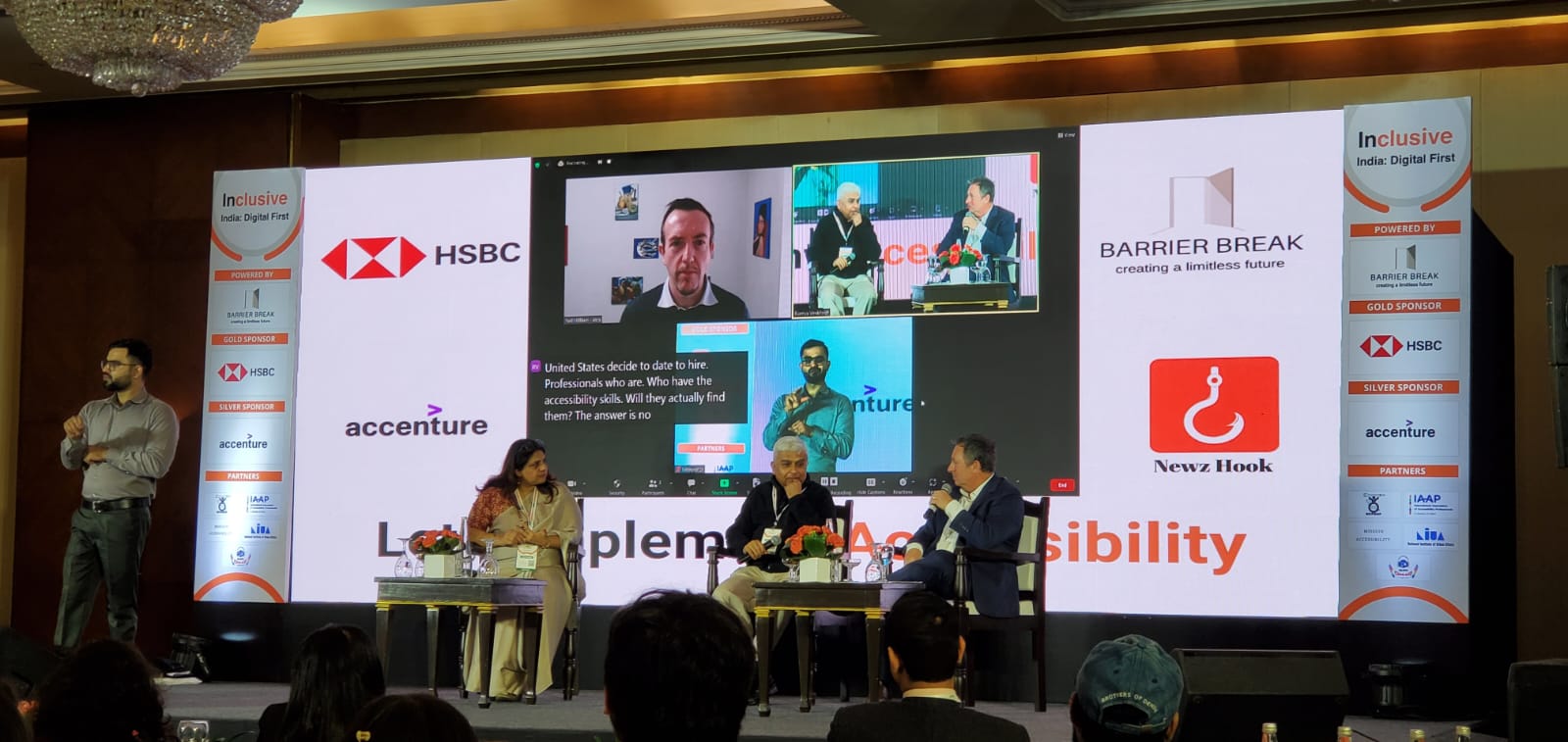
The discussion critically addressed the existing gap in accessible technology and the skills shortage in the market. Emphasizing the urgency of addressing accessibility in digital product development, it called for heightened awareness among trainers and programmers. The session stressed the importance of comprehensive skill-building initiatives and professional certifications to bridge the accessibility gap in the industry.
DesignWhine’s Take On Being A Media Partner
As we navigate the ever-evolving landscape of digital accessibility, the Inclusive India Digital First 2023 emerges as a pivotal event that transcends discussions to provide actionable insights. It served as a platform for profound discussions, shared learnings, and a collective commitment to building a more inclusive digital world.
These revelations serve as a compass, guiding us toward a future where technology is not just accessible but universally empowering. The insights gained from Inclusive India Digital First 2023 will undoubtedly reverberate across industries, sparking a paradigm shift towards a more inclusive and accessible digital landscape. This event stands as a testament to the collaborative efforts required to create a digital world where everyone, regardless of ability, can thrive.
